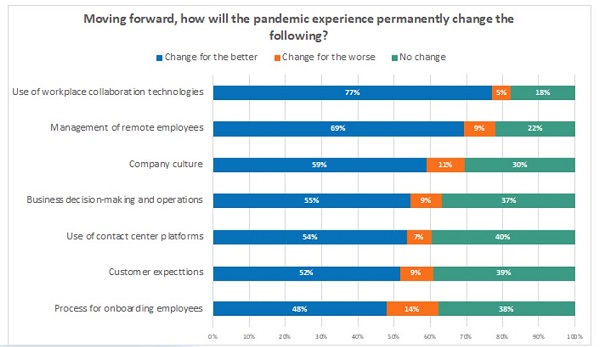As bad as COVID-19 has been for everyone concerned, enterprise IT organizations have won widespread praise for their response to the pandemic. In an unprecedented and unimaginably stressful situation, businesses have at least been able to keep their office workers connected and productive, and much of the thanks for that goes to IT, and especially to the specialists who deploy and manage communications/collaboration systems. And new research from Nemertes Research gives some shape and scale to this accomplishment, and to what comes next.
In the kickoff webinar to Enterprise Connect’s
Virtual Bootcamp: Collaboration for the New Reality, Robin Gareiss, Nemertes founder and president, presented new data showing some of the benefits that enterprise leaders are expecting to gain from their overnight transition to almost fully remote work.
As the table below shows, Nemertes’ survey respondents cited the use of collaboration technologies, learning to manage remote workers, and better corporate culture as changes for the better that resulted from the sudden move to remote work. (Though it’s noteworthy that, in another question, respondents cited management of remote workers as the single biggest challenge to the remote work experience. It’s clearly a work in progress.)
At least 70% off those surveyed will probably continue allowing remote work, according to the Nemertes data, suggesting a long-term shift. Also, where 63% of companies supported work from home (WFH) before the pandemic, now 91% do. Respondents cited improved employee quality of life as the top reason for continuing remote work, with flexibility in the face of future disasters coming in second on this point.
One final point: Though IT spending tends to track the overall economy, which is now struggling, more than half of Nemertes’ respondents said that they expect overall IT spending to increase this year to support WFH, while another 19% said overall IT spending would decrease, but the share spent on WFH would increase. Clearly, enterprises are showing some willingness not only to implement WFH, but strengthen it going forward, even in a challenging economic climate.
Gareiss’s webinar kicked off the first of two weeks in which Enterprise Connect is presenting a wealth of in-depth information on how enterprise IT organizations are responding to the coronavirus, and how they’re planning for the next stage of their pandemic response. To find webinars on a range of topics ranging from video to security to contact centers,
click here and sign up for any webinar. You’ll then be able to access any other asset within the Bootcamp with a single click.











